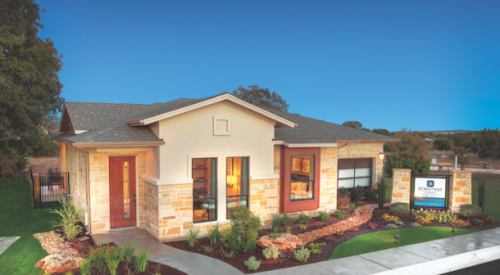Back in December of 1989, who could have guessed that Don Horton’s Arlington, Texas, housing firm would, a decade later, be among the top five home builders in America, with more than $3 billion in 1999 revenue? D.R. saw it clearly. In fact, he saw it in 1987.
| The ultimate entrepreneur: Don Horton |
D.R. Horton has what former President George Bush called "that vision thing" -- "It’s his most outstanding attribute," says longtime right-hand man Don Tomnitz. "In 1987, D.R. saw consolidation of the housing industry coming. He said then that we needed to become a major player and go public. As remarkable as our story is, nothing we’ve done is a surprise to Horton. He saw it, he planned it, years ago. He’s the ultimate entrepreneur."
Don Horton is 49. He grew up in north-central Arkansas, in the small town of Marshall. But keep in mind that this is the same neck of the woods that produced Sam Walton. "Sam’s second (Wal-Mart) store was in Harrison, about 40 miles away," Horton recalls. "I went to the opening. They gave away watermelon."
Horton’s father was a cattleman and Realtor. Don went to college at the University of Central Arkansas, but then picked pharmacy as a major and transferred to the University of Oklahoma to pursue it. He met his future wife, Marty, on the first day of pharmacy school. Four months later, they were married. D.R. left school in 1972, rejecting pill counting in favor of returning to Marshall to take over the family real estate business. His two sons, Ryan and Reagan, were born there in 1973 and 1975.
"I did real well," Horton remembers. "But the real estate business in Arkansas was seasonal. Most of the buyers were tourists. May to October was good, but November to April was pretty slow. I needed more to do in the winter. I wanted to get somewhere that the more I put into it, the better I could do."
When Marty got her teaching degree in 1977, Horton packed up the family and headed for Fort Worth, Texas. "I just walked into a builder’s office (Richard and Eddie Horton, no relation) and told them I’d be glad to sell houses for them," D.R. recalls. "They didn’t have a draw, so my source of income was selling houses. I sold one the first day. That’s how I got to understand this business."
In November 1978, D.R. marched into Southwest Bank and pleaded for $3,000 to finance construction of his first house. He got it. "I sold that house, then went back for the money to build two, then four, then eight more."
He built 20 houses in 1979 and then 80 in 1980. From then on, the business pretty much doubled every year. He didn’t take a day off for the first three years. Don’t count on outworking the man; to this day he gets up every day at 3 a.m.
The steady drumbeat of growth marched on, right through the recession in 1982, the high-interest-rate environment of the early and mid-1980s and even through the Texas crash in the late 1980s and the recession in 1992. "I sold my first home when the mortgage rate was 9 1/2% and closed it at 10 1/2%," he says. "By ‘83, rates went to 16%, but it’s just a sales process you have to take people through. You have to explain the difference between what it costs to rent and what it costs to own. I’ve always enjoyed selling."
A man with vision and the ability to sell that vision to others is hard to stop. "People are my favorite part of this business," says Horton. "I like people. I used to walk down the street and talk to all the homeowners. One of the disadvantages of getting big is there’s no way you can do that."
As country as Don Horton is, it’s hard to see him on Wall Street, launching an IPO and then dealing with the Street through the company’s growth to a $3 billion-a-year colossus. "If you think Don Horton enjoys going to New York, you’re crazy," says Tomnitz. "It would probably be the last place he’d want to spend time. He does it because the company needs it. He always puts the company ahead of himself."
Horton’s sons, Ryan (26) and Reagan (24), are partners in a Fort Worth money management company. "They’d both rather do that than come into the company and be under my thumb," he says.
When he gets away from the business, which happens a little more now than in the past, Horton indulges an interest in hunting and fishing. "Growing up in Arkansas, you’re always big in hunting and fishing. I’ve kind of gotten back into it some. I bought a couple of ranches. I’ve got some cattle and some cutting horses."
Breeding the small, athletic cutting horses is a new attraction. "About a year ago, my wife and I were headed out on a Saturday morning. We thought we’d go look at a couple of housing projects and then go to a movie. We saw a crowd down at Will Rogers Coliseum. It was a cutting horse sale. I sat and watched them sell horses all day, and I started diagramming what the various names and bloodlines would bring. I didn’t buy anything. But the next morning I went back and bought three horses."
He now has a training facility in Gordon and a breeding ranch in Strawn, Texas, and he’s hooked on cutting horses. He sees it as an avocation for his sunset years. But Horton is not ready for that rocking chair just yet.
What’s down the road? "We see ourselves as an international company and a conglomerate, not just a home builder. You start with one house, and it takes awhile to get to 18,000 houses. It will take awhile longer to get to a conglomerate."
Take warning, world. D.R. is still out there, somewhere, beyond the discernible horizon.
Also See:
Tomnitz Is Mr. Manager
Beckwitt Is Horton's Acquiring Mind
Flat-Out Entrepreneurial











